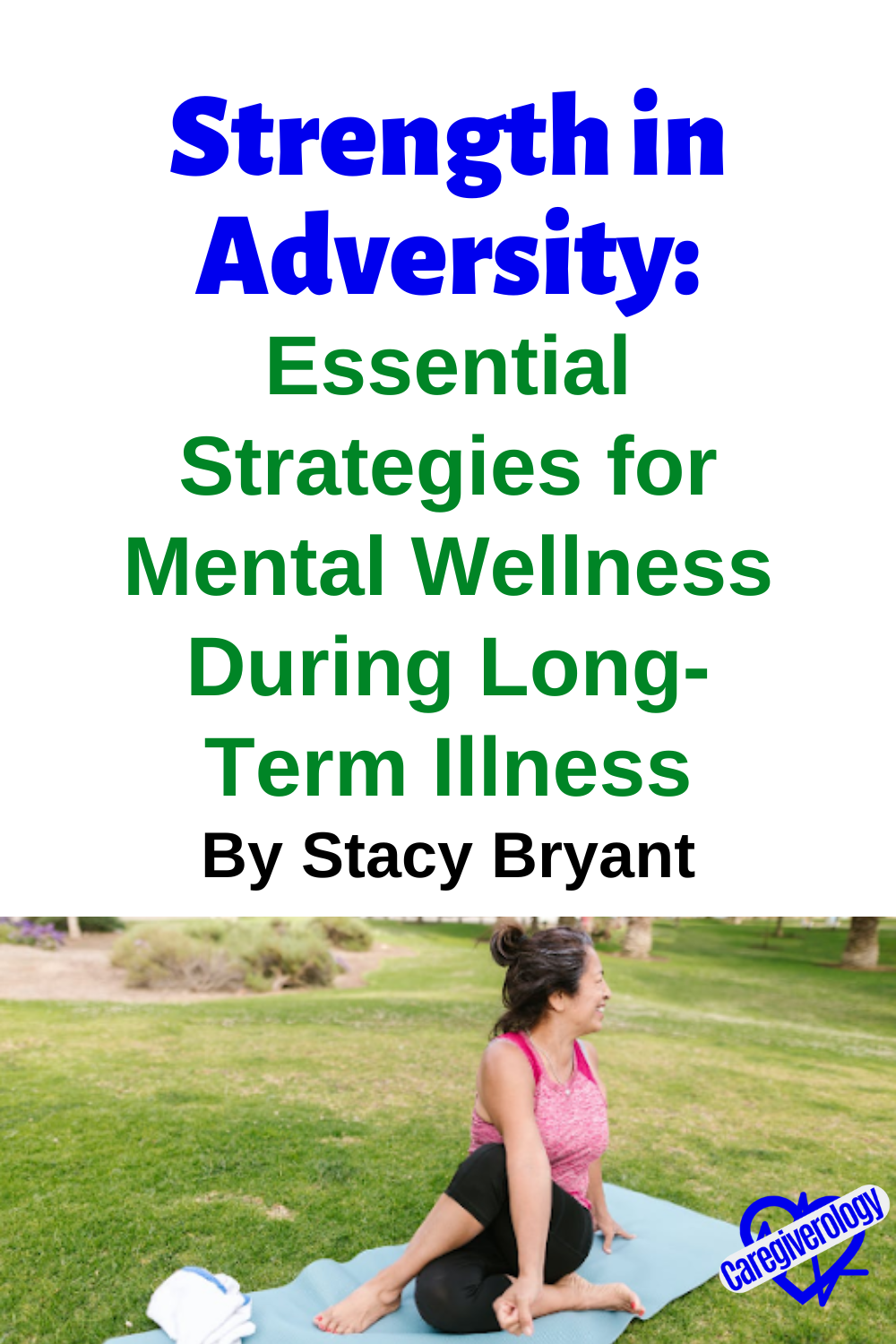Strength in Adversity:
Essential Strategies for Mental Wellness During Long-Term Illness

Across the canvas of life, adversity often sculpts the most meaningful stories. One shape it takes is a long-term illness—a storm that tests both the body and the mind. Facing such a storm demands resilience, courage, and adaptability. While this guide can't promise to quell the storm, it aims to be a beacon, illuminating strategies to enhance mental well-being during this complex journey. By championing your mental wellness, you're choosing to navigate your health journey with strength and dignity—a testament to your unwavering spirit.
Understanding Tying Journey Strategies Learning Valuing Conclusion Bio
Understanding Your Long-Term Illness
You are much more than your diagnosis. However, understanding the nature of your long-term illness—an uncompromising companion accompanying you on life's journey—is pivotal. These conditions persist over extended periods, often measured in years. Perhaps you're wrestling with diabetes, living with heart disease, or contending with an autoimmune disease—the fundamental challenges resonate. Adapting to the reality of a persistent illness can take a significant emotional toll, often amplifying the already arduous physical symptoms. Recognizing this mix of physical suffering and emotional upheaval as a shared experience can alleviate feelings of isolation. Most importantly, acknowledging the profound effects on your mental health marks the start of an empowering journey toward mental resilience.
Tying Together Physical Health and Mental Well-being
When battling a persistent physical ailment, focusing predominantly on physical symptoms is natural. But have you noticed how your mood ebbs and flows with your physical well-being? This correlation is no coincidence; your physical health and mental well-being are beautifully intertwined. When your health dips, it's common for mental wellness to follow. Conversely, a positive mental outlook can buoy your spirits, even on tough days. This dance of mind and body underscores why attending to your mental health with the same dedication you show in managing physical symptoms is essential. Remember, every step toward enhancing mental wellness represents progress along your health journey.
The Imperative of Mental Wellness During Your Long-Term Illness Journey
Facing a long-term illness, you may wonder why there's an emphasis on something seemingly unrelated—your mental well-being. Your attention may naturally veer toward managing physical symptoms, making appointments, or complying with medical advice. However, your mental wellness is far from an unrelated concept. It's an integral, intersecting line that significantly influences your wellness trajectory, affecting everything from sleep patterns and immune function to your ability to cope with routine challenges. More than simply improving your mood, nurturing your mental wellness can steer your overall outlook, inform your pain management strategies, and even affect the efficiency of therapies and treatments. It's time to view nurturing your mental health not as an optional extra but as an empowering piece in your wellness puzzle.
Embracing the Strategies for Maintaining Your Mental Wellness
The landscape of long-term illness is multifaceted, but so, too, are the strategies available to harness and bolster your mental well-being.
- Practice Positive Self-Talk and Mindfulness: Shift the narrative within your mind to one imbued with understanding and compassion. Mindfulness practices, such as meditation, can help anchor you in the present, reducing stress and cultivating tranquility despite the chaos around you.
- Lean on Professional Psychological Support: Support from therapists and psychologists can be an invaluable lifeline. It provides a space to explore your emotions, hone coping strategies, and renegotiate what normalcy means to you.
- Embrace Physical Activity and Exercise: Small movements can yield significant mental boosts. Engaging in suitable and enjoyable physical activities can enhance your physical condition and mood, helping you feel more in control of your body and less dictated by your illness.
- Maintain Nutritional Balance: Nutrition and mental health are closely linked. Aim to fuel your body with fresh, nutrient-rich foods that support brain and body health, enhancing your mental state and equipping you to handle the challenges your illness presents.
- Forge Robust Social Connections and Support Systems: Reach out to friends. Join support groups. Connect (physically or digitally) with others who can relate to your journey. Communicating with others can alleviate isolation and provide emotional comfort and practical assistance.
- Prioritize Restful Sleep: Good sleep can be potently healing. Establish effective sleep routines and incorporate relaxation techniques to bolster your sleep quality.
Learning from Case Studies
When you delve into the experiences of others confronting similar health challenges, you're not merely reading stories—you're mining a wealth of wisdom and insight. These narratives testify to human resilience and adaptability, weaving a tapestry of triumphant victories over adversity. Their lessons can offer both practical strategies and invaluable emotional support. Learn from their experiences, and remember, every individual's story holds a spark of resilience that can guide you on your journey.
Valuing Expert Opinions
Professional healthcare providers understand that treating a long-term illness is not a one-track endeavor. Achieving optimal health outcomes requires an integrative approach encompassing physical treatment protocols and mental wellness strategies. Respected voices in the healthcare landscape continue to amplify the importance of adopting a holistic perspective toward long-term illness management, reinforcing the validity and indispensability of tending to your mental wellness.
The Bottom Line
Nurturing your mental wellness while managing a long-term illness is undoubtedly challenging, yet it's a journey ripe with opportunities for personal growth and resilience-building. As you embrace these strategies and forge your path to mental wellness, remember—you're not alone. You're part of a community navigating their health journeys with strength, determination, and optimism, just like you. Today, let it be the day you prioritize your mental well-being. Seek out trusted resources, lean on your support system, and affirm the importance of mental wellness amidst your health journey. The journey may be challenging, but you are more rigid. You possess an untapped reservoir of strength, ready to face whatever comes your way.
Author Bio

I'm Stacy J. Bryant, a passionate mental health content writer, blending my talents at Ability Plus Mental Health Clinic and SpringHive. My mission is to demystify mental health, providing insights on ADHD, medication management, and more at Ability Plus. Concurrently, I craft engaging web content for Mental Health Care clients at SpringHive Digital Marketing Agency, aiming to make discussions around mental health more accessible. Working across these platforms, I seek to break down barriers, share knowledge, and support our community's mental well-being. My writing is not just information; it's a tool for empowerment designed to guide individuals toward a healthier, more understanding future.
Mental Health and Support Articles
From Strength in Adversity to Home
Recent Articles
-
Lifestyle Medicine Explained: Guiding You Back to Better Health
Apr 20, 25 09:51 AM
Did you know that 80% of chronic diseases—like heart disease, diabetes, and obesity—are preventable through lifestyle changes? Yet, many people rely solely on medication rather than addressing the roo… -
What to Expect During Post-Operative Recovery at Home - Caregiverology
Apr 08, 25 08:21 PM
Surgery may be over, but the journey to full recovery is just beginning, and for many people, the hardest part happens after they leave the hospital. -
How to Plan for Aging: Financial, Health, and Lifestyle Considerations
Mar 29, 25 12:40 PM
Did you know that 70% of people over 65 will need some form of long-term care? Yet, many delay planning until it’s too late. Aging is inevitable, but how we experience it depends on preparation.





New! Comments
Have something to say about what you just read? Leave a comment in the box below.